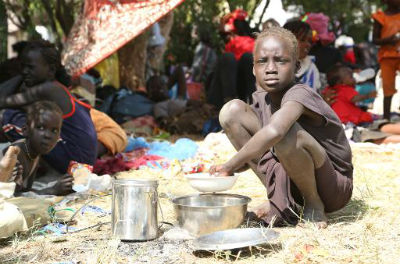 By Aweil Community-USA Media Team
By Aweil Community-USA Media Team
Thursday, 3rd January 2013
January 3, 2013 (SSNA) — On Monday, 31 December 2012, President Salva Kiir announced to the whole world that his government will order the army to draw from the border to pave way for the demilitarization plans to proceed. However, on Sunday, 30 December 2012 prior to President’s hurried announcement, the same government rightfully accused Sudan of “amassing troops” at the border. But in order to substantiate this claim, South Sudan Information Minister, Dr. Marial Benjamin had this to say according to Sudan Triune:
There are now 3,000 troops fully equipped moving towards disputed areas. They are moving with heavy weapons and they started their activities…deeply inside our territory. They have started this with the attack on Northern Bahr el Ghazal State and a raid of farmers in Renk County in Upper Nile State.
Again, on Wednesday, 2 January 2013, Sudan Armed Forces attacked Raja County in Western Bahr el Ghazal State, killing 32 civilians and soldiers, according to the SPLA. This fresh attack led to a number of measured reactions from South Sudanese leaders. First, President Kiir rhetorically asked “What does Bashir want to achieve with this provocation at the time we are supposed to meet in Addis Ababa on Friday 4th?"
Like his boss, Emmanuel Lowilla, the Minister in the Office of the President reacted thus:
We were surprised by this development. We thought Sudanese President Bashir had given a speech in which he said he actually worked for independence of this country and will work again to promote only better relations with us but he will work hard to provide necessary support. Why all of a sudden the Sudanese Armed Forces under his command staged this deadly attack?
Now—in light of these latest developments and official statements—a series of questions arise: is the government of South Sudan misspeaking? Is doublespeak how they plan to sell the demilitarization idea to the skeptical public? Why South Sudan would announce its intent to withdraw ahead of Khartoum? Is Juba attempts to please the AUHIP and willful desire to create some ‘fake goodwill’ with Khartoum ahead of Presidential Summit this Friday, endangering lives and emboldening cunning Khartoum?
While we do not have nor claim to know all answers to the above questions, prior experiences lead us to think that it is premature for South Sudan government to announce its intention before Khartoum does. There is a repeated history here: South Sudan blindly commits to anything flimsy and few hours or days later, Khartoum dishonors the agreement before the ink dries. While examples abound, we will cite here only three:
First, Juba signed onto the Four Freedoms and before the negotiators return to Khartoum, the NCP hardliners had already rejected the deal and charged their negotiators as Sellouts;
Second, Juba sightlessly signed the infamous Cooperation Agreement of 27 September 2012; Khartoum unenthusiastically signed onto it. However, as usual and before the daybreak, Sudan put forth “impossible” demands on Juba such as disarming the SPLM-N.
Third, Juba naively assumed that the Cooperation Agreement, especially the security arrangements and the demilitarization part of it would bring peace to the undefined border areas. Nonetheless, Khartoum has a different strategy: stage ground attacks and aerial bombardments. These malicious activities have claimed more than 16 lives of civilians at Kiir Adem payam in Northern Bahr el Ghazal State and displacing many more, now referred to as the IDPs. A sorrow that is deep and personal fills our hearts at this moment because of those lives lost.
In all post-secession negotiations between South Sudan and Sudan, the latter hastily agrees to what AUHIP/ arbitrators put on the table; Khartoum always agrees reluctantly. Given such a history of bad faith, it is wrong for the President to announce that his government will withdraw the troops from the area when he is in fact not sure whether Bashir will reciprocate this bona fide gesture. Therefore, through putting all his eggs in Bashir and AUHIP’s basket, South Sudan government has not exercised sound judgment in all post-secession issues.
We are talking about the withdrawal because wonders never cease to amaze in Juba. Otherwise,
There are no guarantees in place to warrant this sudden announcement. Bashir has not moved out of Abyei. He still occupies Panthou. His government habitually bombs the border states of Northern Bahr el Ghazal, Western Bahr el Ghazal or Upper Nile. Finally, Khartoum continues to put unnecessary conditions on South Sudan as preconditions for oil resumption.
In summary, Juba must learn from the past mistakes and hone its art of dealing with Sudan. First, it must let Khartoum announce its troop withdrawal from the areas in question. After that Juba can ask for guarantees such that when South Sudan army moves out of border areas such as the 14 Mile Area, Khartoum does not have incentive or maneuverability to move in and occupy the area indefinitely as it has done in Panthou or Abyei since May 2011. Juba must take a leaf from the ages-long axiom: bitten once, twice shy.
Disclaimer: The USA Media Team is a grassroots of Aweil Community effort to sensitize the deceitful ways of Khartoum and to offer a counterargument to making an undisputed land such as the 14 Mile Area a disputed one.

